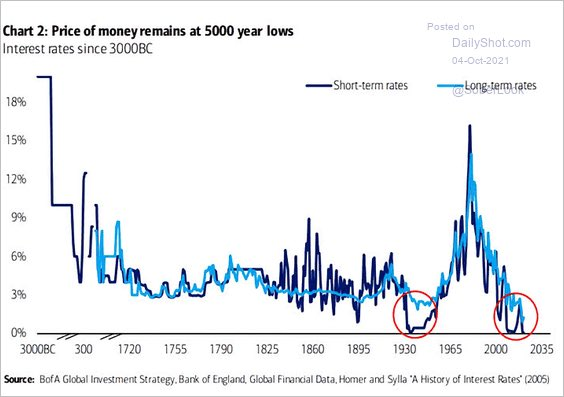My morning train WFH reads:
• Anyone Seen Tether’s Billions? A wild search for the U.S. dollars supposedly backing the stablecoin at the center of the global cryptocurrency trade—and in the crosshairs of U.S. regulators and prosecutors. (Businessweek)
• USPS is trying out a new business, which could transform how millions access cash and pay bills The Postal Service program presents an option to payday lenders and other institutions that target vulnerable populations with outsize fees and interest rates. (Washington Post)
• Are We Craving Risk or Losing Reward? 1980-2000 will go down as the most favorable 20-year period in U.S. investment history. However, we haven’t changed our collective narrative to reflect this yet. We are still acting like this period was “normal” though, in retrospect, it clearly wasn’t. Because, if you look over the last six centuries, interest rates across the globe have been on a slow downward trajectory: (Of Dollars And Data)
• China’s Energy Crisis: A simple breakdown of the crisis and its impact on the world China’s energy crisis is best understood through the simple, Econ 101 lens of supply and demand, with a particular focus on the coal market. Net-net, we have demand up and supply down, leading to widespread shortages, rising costs, and a ripple effect that extends across the globe—the stage is set for what could be a long, cold winter. (Curiosity Chronicle)
• How to Find the Next Hot New Growth Stocks Which young companies have the chops to be tomorrow’s stars? We ask canny strategists for their picks, and their methods. (CIO)
• The Great Inflation Debate: Watching the inflation-watchers Whether we are living through the beginning of a new inflation is uncertain. What is clear is that we are living through a great inflation debate. I cannot think of a period in recent memory, in which there was so little agreement on likely future trends. The uncertainty causes real anxiety for policy-makers and the public. Does it amount to a crisis of the authority of economics? (Chartbook)
• The C.E.O. Other C.E.O.s Turn to for Advice Rich Lesser, who has run Boston Consulting Group for eight years, is stepping down at a moment of enormous change. (New York Times)
• The pandemic is testing the limits of face recognition Government use of face ID systems exploded during the pandemic—but tying it to critical services has left some people locked out at the moment they needed help the most. (MIT Technology Review)
• One of the largest comets ever seen is headed our way: Comet Bernardinelli-Bernstein offers a rare opportunity for a generation of astronomers to study an object from the extreme edges of the solar system. (National Geographic)
• How Fear and Family Values Led to the Biggest Hit in Netflix’s History More South Koreans are dying alone and in poverty, so why not risk it all in a fight to the death? (Slate)
Be sure to check out our Masters in Business interview this weekend with Chamath Palihapitiya, founder of Social Capital. He began his career as an engineer and team leader at AOL, Facebook, and Slack, but soon moved into Venture Capital. He earned the nickname “SPAC King” for numerous successful deals he has done, and today is a part-owner of the Golden State Warriors.
The Price of money remains at 5000-year lows

Source: BAML via @Rob_Hager
Sign up for our reads-only mailing list here.

